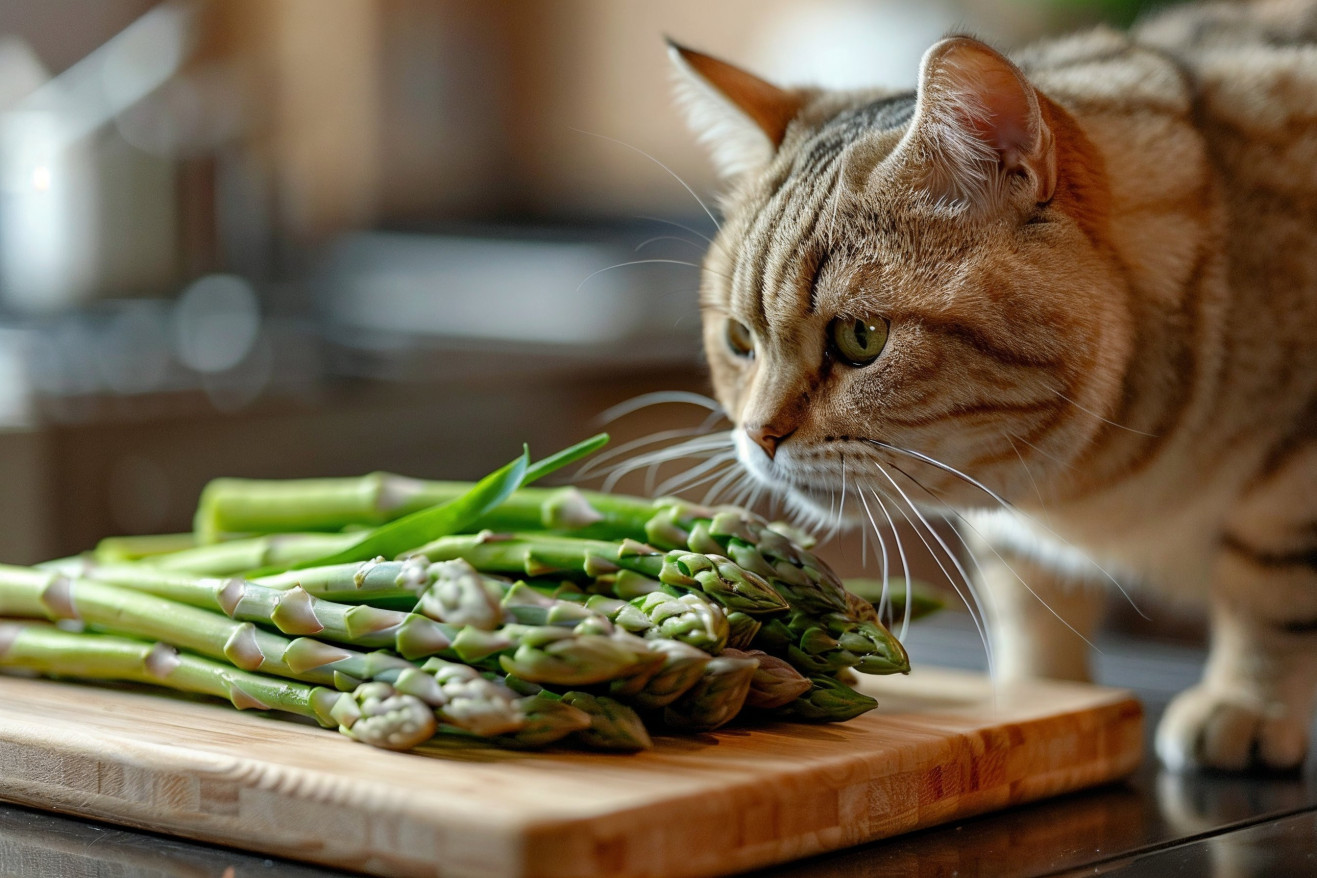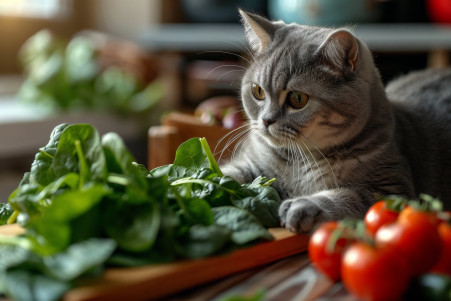Can Cats Eat Asparagus? Nutritional Facts and Safety Tips
4 March 2024 • Updated 4 March 2024

Asparagus is often hailed as a superfood for humans, but is it safe for cats to eat? The good news is that cats can eat asparagus in moderation. Asparagus is a great source of fiber, vitamins, and minerals, all of which can help with digestion and boost the immune system.
Make sure to feed your cat small, cooked pieces that are free of any seasonings. That said, it’s important to make sure your cat doesn’t eat too much asparagus, which can lead to urinary tract problems, and to always prioritize a diet that’s rich in meat for your obligate carnivore.
This article takes a deep dive into the complicated relationship between asparagus and your cat’s health from the perspective of veterinary science and the science of animal nutrition. By discussing the dietary needs of cats and the nutritional content of asparagus, we’ll also summarize what research says about the inclusion of plant-based foods in the diets of carnivorous pets.
Our hope is to give you a comprehensive understanding of how asparagus can fit into your cat’s diet so that you can make the best choices for your cat’s health.
Can cats eat asparagus?
A Closer Look at the Cat’s Digestive System
The cat’s digestive system, which includes the organs from the mouth to the anus, is highly specialized for processing meat.
As the Merck Veterinary Manual explains, enzymes in the mouth start the process of breaking down food, which is then continued in the stomach and intestines where the cat’s body absorbs nutrients and eliminates waste.
Because cats are obligate carnivores, they get most of their essential nutrients from animal-based proteins. That means plant-based foods, like asparagus, are not part of their natural diet, and their digestive systems are not well-equipped to break down cellulose, the primary component of plant cell walls.
Some of the most common digestive issues in cats are vomiting, diarrhea, and constipation, all of which are signs that the digestive system is not functioning as it should.
In terms of asparagus, the Washington State University Veterinary Teaching Hospital explains that the cat’s highly acidic stomach and efficient nutrient absorption are two of the most important things to know. These factors suggest that cats may be able to digest small amounts of plant-based foods, like asparagus, differently, potentially reaping the benefits of the fiber while still sticking to their carnivorous diet.
As we think about where asparagus fits into a cat’s diet, it’s important to remember that while their digestive systems may be able to tolerate some plant-based foods, their anatomy is still geared toward eating meat. This will become especially important as we look at exactly what cats need from their diet and whether asparagus can provide it.
Meeting the Needs of a Carnivore: What Cats Need
Cats are obligate carnivores, which means that their dietary needs are primarily met through animal proteins. According to the Cornell University College of Veterinary Medicine, cats do best with a diet that is high in protein, moderate in fat, and low in carbohydrates.
In order to meet their nutritional needs, cats need to get a variety of essential nutrients from their food, including vitamins, minerals, fatty acids, and amino acids. Vegetables are not a significant part of a cat’s diet and are usually not necessary.
Asparagus, while not toxic, does not provide the essential nutrients that cats need from animal-based proteins.
VCA Animal Hospitals’ veterinary staff explains that cats need to eat meat to get certain amino acids and fatty acids that are not present in plants.
So, while you may be considering adding asparagus to your cat’s diet, it’s important to make sure that you’re focusing on foods that meet the standards set by the Feline Nutrition Expert Subcommittee of the Association of American Feed Control Officials.
These standards are used to make sure that commercial cat foods are nutritionally complete and balanced and meet the specific needs of cats at different life stages and with different health concerns. As a result, while asparagus may have some benefits, it should never be used to replace the essential animal-based nutrients that cats need in their diets.
Asparagus for Cats: The Bottom Line
Asparagus isn’t something that should be a regular part of a cat’s diet, but it can be beneficial if it’s given in the right way. For example, the fiber in asparagus can help with digestion, and the vitamins and minerals, including potassium, vitamin A, vitamin C, and vitamin K, can help support a cat’s overall health.
According to CatTime, these vitamins and minerals can also help with heart health and regulating blood pressure. That said, it’s important to make sure that asparagus is given in moderation. Preventive Vet notes that asparagus should be cooked, ideally steamed or boiled, to make it easier to digest, and it should be cut into small, bite-sized pieces and served plain to avoid the risk of choking or other digestive issues.
However, there are also some downsides to giving asparagus to cats. For example, asparagus is high in alkaline, and that can change the pH of a cat’s urine, which can lead to urinary tract issues.
As a result, asparagus should be given to cats in small amounts, and it should make up no more than 10% of a cat’s daily caloric intake to ensure that it’s a treat and not a regular part of their diet.
As the idea of adding asparagus to a cat’s diet is studied further, it’s important to note that there isn’t a lot of research on the long-term effects of this practice. That means that it’s important to think critically about whether or not asparagus should be a part of a cat’s diet and to make sure to talk to a vet about it.
Evaluating Asparagus for Cats: Nutritional Value and Health Benefits
Asparagus is a good source of several vitamins and minerals, as well as fiber, all of which can be beneficial to cats. According to Verywell Fit, asparagus is a good source of vitamin K, vitamin A, and zinc and is high in dietary fiber, which can help with digestion and fat absorption—all of which are good for the general health of many animals, including cats.
However, the specific nutritional needs of cats require a closer look.
While asparagus has a fair amount of protein, it doesn’t contain the animal protein that cats need in their diet; however, its low-calorie content, as mentioned by WebMD, can help cats that are overweight lose weight.
Medical News Today explains that the nutrient-rich nature of asparagus, including folate, vitamin A, and vitamin C, can help with a variety of bodily functions without adding extra calories. However, the fact that asparagus contains asparagine, an amino acid that’s important for brain development, raises the question of how it affects obligate carnivores that get the amino acids they need from meat.
In the context of a well-balanced cat diet, asparagus should be considered an occasional supplement rather than a regular part of a cat’s diet. While adding asparagus to a cat’s diet can add variety and potential health benefits, it’s important to remember that cats are obligate carnivores and need a diet that meets their specific nutritional needs.
As a result, asparagus can be part of a cat’s diet if it’s added in a way that’s mindful of their nutritional needs and makes up a small portion of their overall diet.
How to Add Asparagus to Your Cat’s Diet
If done properly, adding asparagus to your cat’s diet can be a healthy addition. To start, add a small amount—no more than two teaspoons of cut asparagus—to avoid upsetting your cat’s stomach.
This amount is recommended by Spot Pet Insurance to minimize the impact of asparagus’s high alkaline levels on your cat’s urine pH balance. When cooking asparagus, steam or boil it to make it easier to digest and make sure to leave off any seasonings, especially salt.
To make sure your cat has a good reaction, monitor them after you give them the asparagus. Look for any signs of digestive upset or changes in the smell of their urine, which could be a sign of a sensitivity to asparagus’s sulfur content. Spot Pet Insurance recommends using asparagus in moderation and avoiding it for cats with a history of urinary problems.
Before you start feeding your cat asparagus on a regular basis, talk to your vet. They can let you know if it’s safe for your cat and help you determine portion sizes based on your cat’s individual health needs to make sure that asparagus is a healthy addition to their diet and not a problem.
Conclusion: Cats and Asparagus
So, in conclusion, asparagus can be a healthy and safe addition to a cat’s diet if it is given in moderation and with the approval of a veterinarian. Both the Cornell University College of Veterinary Medicine and VCA Animal Hospitals stress the importance of a meat-based diet for our obligate carnivore pets. While asparagus should not replace the essential meat-based foods, it can be a healthy, fiber-rich addition.
Pet parents should always be careful when introducing treats to their pets, making sure that any new food meets their pet’s nutritional needs. While asparagus isn’t a necessary part of a cat’s diet and should be a supplement to meals that are rich in protein, it can be a healthy, low-calorie treat that can help with weight control when given in the right amounts.
In the end, pet parents should balance their desire to add new foods like asparagus to their cat’s diet with the need to make sure that they are being careful and considerate of their cat’s health and nutritional requirements.
It’s important for pet parents to make sure that they are making informed, responsible decisions about their pet’s diet. Always talk to your veterinarian about how to make sure that your cat’s diet is the best that it can be.


